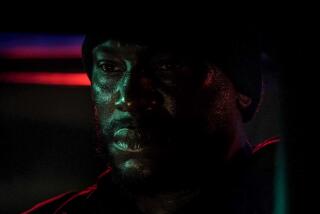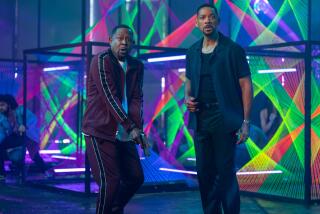ARE WE Falling Apart? : In its third big week at the box office, ‘Falling Down’ has clearly touched a nerve. L.A. moviegoers tell us why. Plus, a reality check from a veteran reporter. And a film comment, Page 7. : The Real Everyman and Everywoman
- Share via
After watching “Falling Down,” the current film about a laid-off defense worker who snaps one day in an L.A. traffic jam, Carrie Walker and her husband, Patrick, were arguing over the film’s accuracy.
“I guess the Hispanic gang members (were stereotyped),” Carrie said. “It seemed awfully over-dramatized, him swearing at his girlfriend . . . .”
“But in that group--I mean, that’s an accurate portrayal of that group,” Patrick countered.
“I’ve never ridden in a car with them,” she said. “I don’t know. Seriously, it’s Hollywood.”
“It’s not just Hollywood,” he said. “It’s reality.”
To most of the country, “Falling Down” is just another movie about another Everyman in the urban jungle who strays from the path of socially acceptable behavior by venting his rage about everything he thinks is wrong with the city. But to some people who live in that jungle, it’s a statement about life in their hometown.
“In the last couple of years, (Los Angeles) has gotten a pounding. But I think it’s kind of deserved,” said Carrie, 29, of South Pasadena.
“I think they showed the worst. I mean, it’s realistic if you want to show that end of the spectrum. That stuff does happen. It’s scary,” she said, but added, “It’s not accurate because it’s not showing the whole picture. It just dramatizes--puts that one element under a microscope.”
But Los Angeles is nothing if not under a microscope these days. The federal trial of the police officers charged with violating Rodney G. King’s civil rights is under way. The trial for the men charged with beating Reginald O. Denny will start soon. And the anniversary of last spring’s civil unrest is approaching.
“I get kind of angry because this kind of inflames a bad situation already,” Carrie said. “I wasn’t so sure that I wanted to see (the movie) in the first place. It’s not the best time.”
As Michael Douglas’ character--a man named Bill Foster but called D-FENS after his vanity license plate--treks across Los Angeles, he doesn’t exactly help the physical and emotional recovery of the city. He abandons his car and starts walking with the declaration: “Clear a path--I’m going home.”
The feelings of patrons coming out of three different theaters in Pasadena, Hollywood and Century City seemed generally positive--at least toward the film, not necessarily the city.
Harry Jones of Los Angeles, the only black moviegoer quoted here, also said the release may have been bad timing. “But when I went in to see the picture, the Denny and King trials were the last thing on my mind. I wanted to be entertained,” he said.
*
He enjoyed the film, but said he would only recommend it to “reasonable” people--not someone who is upset about a lost job or divorce.
He also thought the film had a realistic view of Los Angeles.
“It wasn’t stereotyped because it was actually what takes place. They showed East L.A.--you see nothing but graffiti over there. They showed . . . a skinhead that does have some prejudice within him. It was actual life itself,” he said.
Tim Sims, 28, of South Pasadena, said, “This is definitely Los Angeles. You couldn’t have the same problems in New York or Chicago, they would be different. In Los Angeles, it’s the traffic jams and the heat and the gangs and the availability of guns.”
Still, he said, the film is a concentrated version of life here. “I don’t think if you walked from Pasadena to Venice you would encounter all of that, but you might.”
Within days of the film’s release, people levied criticism against “Falling Down,” calling it racist or saying its release now was insensitive.
Michele Harrell of Silver Lake didn’t think those charges are fair. “I think that the commentary is less racial relations and more applied to the working class. I mean, the guy went nuts because he wasn’t able to survive in the society.”
The film does stereotype some characters, but, she said, “I think stereotypes exist because there’s an element of truth to them . . . (If filmmakers are) going out of (their) way to show minorities out of their context, then they’re not going to be believable.
“I just don’t see it as any big white man against the minorities. . . . They come into contact and they come into conflict--what’s wrong with showing that?” Harrell said. “It might help people realize how brutal it’s getting.”
That’s exactly the problem, according to leaders of Asian-American organizations, who are concerned because of several recent attacks on Korean-American store owners. Douglas’ character takes a swipe at everybody--from the Korean-American grocer to Latino gang-bangers, from a neo-Nazi to wealthy golfers at their exclusive club--but that argument doesn’t hold water for some.
“Just because (Foster’s) an equal-opportunity bigot doesn’t make it fair,” said Laura Park, 23, who serves on the board of the Media Action Network for Asian-Americans.
Her group and others have criticized Warner Bros. studio for releasing a film they feel is racially divisive. Particularly offensive, Park said, is the scene where Foster fights with a Korean-American store owner, eventually taking a baseball bat to shelves of merchandise.
“You come to my country. You take my money. And you don’t even have the grace to learn my language?” screams Foster during this first rampage after leaving his car.
“He attacks (the grocer’s) ethnicity, by referring to ‘my country’ and ‘your country,’ ” Park said. “It had nothing to do with his overcharging the customer, it had to do with his ethnicity.”
*
Jeana Park, who is not related to Laura, agreed. “Where does it say that you have to speak perfect English to be an American? Where does it say that you have to be white to be an American?
“That (character) was the stereotype that led to the Korean-Americans taking the brunt of the damage last April,” she said.
Jeana Park, 22, is executive director of the newly founded Korean-American Advocates for Justice. The group is actively discouraging people from seeing the film, telling them that they will show it to them for free once it is released on video.
But other groups, including the Women’s Organization Reaching Koreans, are looking for a long-term relationship with Warner Bros. and other studios. Hoping to start curbing racial insensitivity in Hollywood, representatives of all three organizations met with people from Warner’s March 4 and are scheduled to again this week.
Yet while “Falling Down” is being taken so seriously here, it’s still pure entertainment in other parts of the country, one of the reasons it has claimed the top box-office spot for three weeks running.
Colette Chandler, 22, a senior at Ohio State University in Columbus, wasn’t impressed. “Everyone that came out of there with me . . . they just thought it was all right,” she said. “It was pretty intense, but it wasn’t their cup of tea.”
She found the film too violent, and not a flattering picture of Los Angeles.
“I don’t think it’s going to prevent people from going, but people are going to get a bad idea of Los Angeles . . . they’re going to think the movie portrays the city exactly,” Chandler said.
Mike Miller, a 21-year-old junior at OSU, said the movie was “different,” but had some funny parts.
“If there was some kind of message, I don’t know what it is, except maybe (that) life’s stressful. Before you blow up, get some help,” he said.
Miller said the film didn’t really give Los Angeles “a bad rap,” and he was surprised that people were offended by the film.
“I think people are blowing stuff out of proportion. But then, I don’t live out there.”
More to Read
Only good movies
Get the Indie Focus newsletter, Mark Olsen's weekly guide to the world of cinema.
You may occasionally receive promotional content from the Los Angeles Times.







